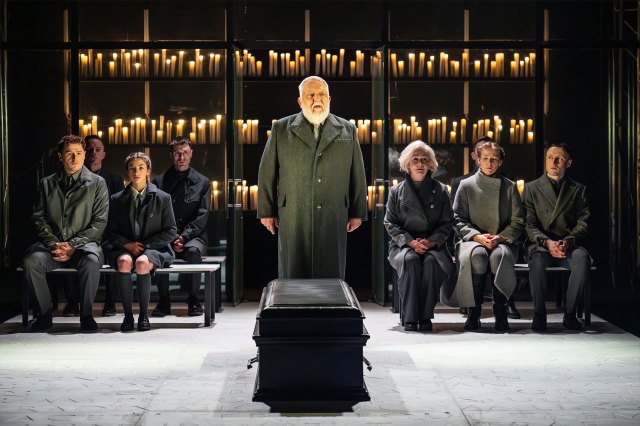Titus Andronicus with Simon Russell Beale at the RSC’s Swan Theatre – review
Max Webster’s revival runs until 7 June

For all his many directing credits – including notably The Importance of Being Earnest and Life of Pi – it’s strange that this production of what must charitably be described as one of the lesser Shakespeares is Max Webster’s first for the RSC. On this thrilling showing, it’s unlikely to be his last.
Leaning heavily into the kind of blood-soaked revenge that his Jacobean namesake John deployed so memorably, Webster tackles the Bard’s goriest play with boldness and plenty of panache. With a stark modern set and costumes designed by Joanna Scotcher, the monochromatic palette of imperial Rome is broken only by some subtle blues to distinguish the Goth contingent from their Roman enemies – and a range of scarlet accoutrements that deliver the famously high body count in seemingly endless ways.
Thus, in stylised set pieces, red hoses deliver jets of blood, a red noose hangs ominously for one victim, while a red chainsaw is even wielded at one point in a moment resonant of Elon Musk’s metaphorical dismemberment of US government departments. Thanks to some carefully effective lighting (Lee Curran) and sound (Tingying Dong), these are all handled in a way that prevents them from being too graphically naturalistic. We’re talking Tarantino, not the Ten O’Clock News.
That’s not to say that the gore isn’t going to be a prime talking point, as is so often the case with Titus. In a ploy probably more geared to marketing than necessity, the RSC is handing out blankets to the front row of the Swan’s stalls. But the truth is you’d have to be of an extremely nervous disposition to faint at this version.

And so the focus falls on the actors, navigating the horrors of Shakespeare’s text to find some kind of sympathetic quality in their relentlessly hideous characters. At its heart is Simon Russell Beale’s Titus, a hollowed-out husk of the mighty general recalled from the wars to proclaim a new emperor. For all the gravitas of his performance, this is clearly a man for whom the loss of 22 sons (and counting) weighs heavily, and his grief at what is done to his daughter Lavinia is palpable.
Titus’s sibling Marcus here becomes his sister Marcia, strongly played by Emma Fielding, hinting that Titus might be relying on her strength as a substitute for that of his own unmentioned wife. Natey Jones finds some humanity in the uncomfortably villainous Moor Aaron, almost evoking empathy when pleading for the life of his infant son, and Letty Thomas does a fine line in heartbreaking sobs as the horrifically mutilated Lavinia. There’s a fabulously creepy turn from Joshua James as the new emperor Saturninus, while Wendy Kweh’s Tamora makes a feisty Queen of the Goths.
Promisingly, there’s real depth across the entire cast – including a sublime chorister’s vocal from the press night’s young Lucius, Tristan Arthur (composer Matthew Herbert) – and while “enjoyable” is hardly the mot juste for any production of this violent, vindictive and vicious play, Webster’s interpretation does score highly for style, pace and performances. Just don’t wear your best frock on the front row…



















